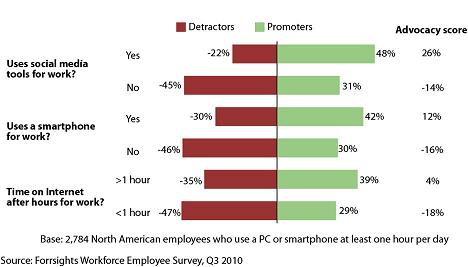Employee Advocates Emerge From Empowered Workforce
Ever heard a senior leader in your organization proclaim “Everyone’s in sales!”? I have. In fact, it’s a phrase I’ve heard a lot in the last three years from executives at conferences, industry events, client meetings and more. To me, it’s right up there with “All hands on deck!” and “Ask not what your country can do for you, ask what you can do for your country” (only in a less evocative, corporate-speak kind of way).
- How likely are you to recommend your company’s products or services to a friend or family member?
- How likely are you to recommend a job at your company to a friend or family member?

What it means: employees who are optimistic about technology and well-equipped with information and communications technology (ICT) are more likely to be net advocates than those who are not.
But in the overall analysis, functions like sales, HR, and finance score high in employee advocacy, while IT professionals score low. As IT professionals who are presumably in love with technology, you actually buck the trend.
So here are my questions: Do you advocate for your company’s products, services, and jobs? What role should business technology leaders play to encourage employee advocacy?
Weigh in if you have an opinion.